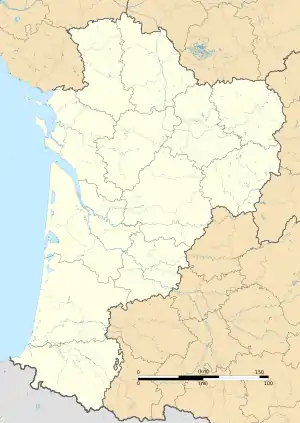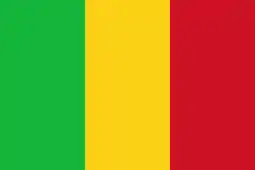Brive-la-Gaillarde
Brive-la-Gaillarde (French pronunciation: [bʁiv la ɡajaʁd]; Limousin dialect of Occitan language: Briva la Galharda) is a commune of France. It is a sub-prefecture of the Corrèze department. It has around 50,000 inhabitants, while the population of the urban area was 89,260 in 1999.
Brive-la-Gaillarde | |
|---|---|
Subprefecture and commune | |
 The Town Hall of Brive-la-Gaillarde | |
.svg.png.webp) Coat of arms | |
Location of Brive-la-Gaillarde 
| |
 Brive-la-Gaillarde  Brive-la-Gaillarde | |
| Coordinates: 45°09′30″N 1°31′56″E | |
| Country | France |
| Region | Nouvelle-Aquitaine |
| Department | Corrèze |
| Arrondissement | Brive-la-Gaillarde |
| Canton | Brive-la-Gaillarde-1, 2, 3 and 4 |
| Intercommunality | Brive |
| Government | |
| • Mayor (2020–2026) | Frédéric Soulier[1] |
| Area 1 | 48.59 km2 (18.76 sq mi) |
| Population (2017-01-01)[2] | 46,916 |
| • Density | 970/km2 (2,500/sq mi) |
| Demonym(s) | Brivistes |
| Time zone | UTC+01:00 (CET) |
| • Summer (DST) | UTC+02:00 (CEST) |
| INSEE/Postal code | 19031 /19100 |
| Elevation | 102–315 m (335–1,033 ft) (avg. 142 m or 466 ft) |
| 1 French Land Register data, which excludes lakes, ponds, glaciers > 1 km2 (0.386 sq mi or 247 acres) and river estuaries. | |
Although it is by far the biggest commune in Corrèze, the capital is Tulle. In French popular culture, the town is associated with a song by Georges Brassens.
History
Even though the inhabitants settled around the 1st century, the city only started to grow much later. From around the 5th century onwards, the original city began to develop around a church dedicated to Saint-Martin-l'Espagnol. During the 12th century walls were built around the city and during the Hundred Years' War a second wall was built. These fortifications no longer exist and have been replaced by boulevards.
The commune was named "Brive" until 1919, when it was renamed "Brive-la-Gaillarde". The word "Gaillarde" (still used in current French) probably stands for bravery or strength in the city's name, but it can also refer to the city's walls. Brive now extends outside of its original boundaries into Malemort and Ussac.
During World War II, Brive-la-Gaillarde was a regional capital of the Resistance, acting as a seat of several clandestine information networks and several of the principal resistance movements, including the Armée secrète (or “Secret Army”) and the Mouvements Unis de la Résistance (or "United Movements of the Resistance").
Brive-la-Gaillarde was the first city of Occupied France to liberate itself by its own means, on 15 August 1944. For this, the city received the “Croix de guerre 1939–1945” military decoration.
The medieval centre is mainly a commercial district with retail shops and various cafés. It is also the location of the city hall, the main police station, and the Labenche museum. One notable landmark outside the inner city is the Pont Cardinal, a bridge which used to be a crossing point for travelers from Paris to Toulouse.
Climate
| Climate data for Brive-la-Gaillarde (1987–2010 averages, extremes 1987–present) | |||||||||||||
|---|---|---|---|---|---|---|---|---|---|---|---|---|---|
| Month | Jan | Feb | Mar | Apr | May | Jun | Jul | Aug | Sep | Oct | Nov | Dec | Year |
| Record high °C (°F) | 18.8 (65.8) |
24.4 (75.9) |
26.7 (80.1) |
30.0 (86.0) |
32.9 (91.2) |
39.6 (103.3) |
42.1 (107.8) |
40.7 (105.3) |
35.9 (96.6) |
30.9 (87.6) |
25.6 (78.1) |
19.3 (66.7) |
42.1 (107.8) |
| Average high °C (°F) | 9.7 (49.5) |
11.6 (52.9) |
15.2 (59.4) |
17.4 (63.3) |
22.1 (71.8) |
25.3 (77.5) |
27.4 (81.3) |
27.5 (81.5) |
23.5 (74.3) |
19.1 (66.4) |
12.8 (55.0) |
9.8 (49.6) |
18.5 (65.3) |
| Daily mean °C (°F) | 5.3 (41.5) |
6.2 (43.2) |
9.1 (48.4) |
11.3 (52.3) |
15.6 (60.1) |
18.7 (65.7) |
20.7 (69.3) |
20.7 (69.3) |
16.9 (62.4) |
13.7 (56.7) |
8.3 (46.9) |
5.5 (41.9) |
12.7 (54.9) |
| Average low °C (°F) | 0.9 (33.6) |
0.8 (33.4) |
2.9 (37.2) |
5.3 (41.5) |
9.1 (48.4) |
12.1 (53.8) |
14.0 (57.2) |
13.8 (56.8) |
10.3 (50.5) |
8.2 (46.8) |
3.8 (38.8) |
1.2 (34.2) |
6.9 (44.4) |
| Record low °C (°F) | −11.8 (10.8) |
−16.4 (2.5) |
−12.6 (9.3) |
−5.4 (22.3) |
−1.7 (28.9) |
2.1 (35.8) |
5.2 (41.4) |
3.6 (38.5) |
0.6 (33.1) |
−5.6 (21.9) |
−10.2 (13.6) |
−13.4 (7.9) |
−16.4 (2.5) |
| Average precipitation mm (inches) | 69.9 (2.75) |
61.3 (2.41) |
63.3 (2.49) |
92.3 (3.63) |
86.9 (3.42) |
76.6 (3.02) |
69.0 (2.72) |
71.1 (2.80) |
80.1 (3.15) |
86.8 (3.42) |
85.0 (3.35) |
72.1 (2.84) |
914.4 (36.00) |
| Average precipitation days (≥ 1.0 mm) | 10.8 | 9.3 | 9.4 | 12.6 | 10.6 | 9.3 | 7.8 | 8.4 | 8.9 | 10.9 | 11.5 | 10.7 | 120.2 |
| Mean monthly sunshine hours | 91.1 | 113.3 | 169.6 | 177.5 | 215.1 | 241.1 | 256.3 | 241.3 | 200.3 | 137.4 | 85.2 | 79.5 | 2,007.6 |
| Source: Météo France[3] | |||||||||||||
Administration
The most recent mayors of Brive-la-Gaillarde were:
- 1966–1995: Jean Charbonnel
- 1995–2008: Bernard Murat
- 2008–present: Philippe Nauche
Population
|
|
Transport
Brive-la-Gaillarde railway station offers connections to Limoges, Périgueux, Bordeaux, Clermont-Ferrand, Toulouse, and several regional destinations. The A20 motorway connects Brive with Limoges and Toulouse, the A89 with Bordeaux.
Brive–Souillac Airport lies south of the city. It was opened in 2010 to replace the older Brive-La Roche Airport.
Sport
The city is home to a rugby union team, CA Brive. It also hosted the 2009 Junior World Rowing Championships.
Notable inhabitants
- Guillaume Dubois (1656–1723), cardinal and statesman
- Pierre André Latreille (1762–1833), entomologist
- Jean-Baptiste Treilhard (born January 3, 1742 in Brive-la-Gaillarde – died December, 1810 in Paris) was a French jurist and politician at the end of the 18th and the beginning of the 19th century.
- Nicolas Ernault des Bruslys, born on 7 August 1757 in Brive-la-Gaillarde and died on 25 September 1809 in Reunion, is a French general of the Revolution and the Empire.
- Guillaume Marie Anne Brune (1763–1815), marshal of France
- Michel Labrousse (1912–1988), scholar of Roman history
- David Feuerwerker (1912–1980) was a rabbi and professor of French Jewish history (Geneva, October 2, 1912 – Montreal, June 20, 1980).
- Antoinette Feuerwerker (1912–2003) Belgian lawyer and educator, wife of David Feuerwerker; Member of the Combat movement in Limousin alongside Edmond Michelet;
- Alceste De Ambris (born September 15, 1874 to Licciana Nardi, and died December 9, 1934 in Brive-la-Gaillard), an Italian politician and syndicalist;
- Robert Margerit (1910–1988), writer.
- Edmond Michelet (1899–1970), politician, leader of the Movement Combat Limousin; arrested by the Gestapo in Brive in February 1943; died in the village of Marcillac, the town of Brive;
- Patrick Sebastien (born 1953), imitator, actor, singer, television host.
- Xavier Patier (1958– ), civil servant and writer
- Cédric Villani (1973– ), mathematician; Fields Medalist in 2010
- Cédric Heymans (1978– ), French international rugby union player
- Dimitri Yachvili (1980– ), French international rugby union player
- Damian Penaud (1996– ), French international rugby union player
- Marine Serre (1991– ), French fashion designer
Twin towns – sister cities
Brive-la-Gaillarde is twinned with:[4]
 Guimarães, Portugal
Guimarães, Portugal.svg.png.webp) Joliette, Canada
Joliette, Canada Lauf an der Pegnitz, Germany
Lauf an der Pegnitz, Germany Melitopol, Ukraine
Melitopol, Ukraine Sikasso, Mali
Sikasso, Mali
See also
References
- "Répertoire national des élus: les maires". data.gouv.fr, Plateforme ouverte des données publiques françaises (in French). 2 December 2020. Retrieved 11 December 2020.
- "Populations légales 2017". INSEE. Retrieved 6 January 2020.
- "Brive (19)" (PDF). Fiche Climatologique: Statistiques 1981–2010 et records (in French). Meteo France. Archived from the original (PDF) on 30 March 2018. Retrieved 30 March 2018.
- "Villes jumelées". brive.fr (in French). Brive-la-Gaillarde. Retrieved 2020-04-02.
External links
| Wikimedia Commons has media related to Brive-la-Gaillarde. |
| Wikisource has the text of the 1911 Encyclopædia Britannica article Brive. |
- Official website (in French)